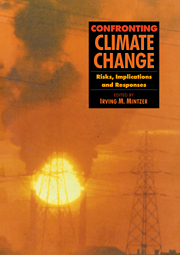Book contents
- Frontmatter
- Contents
- Foreword
- Acknowledgements
- List of Reviewers
- 1 Living in a Warming World
- I The Science of Climate Change
- II Impacts of Global Climate Change
- III Energy Use and Technology
- IV Economics and the Role of Institutions
- V Equity Considerations and Future Negotiations
- Annex I
- Annex II
- Glossary
- Index
Annex I
Published online by Cambridge University Press: 06 January 2010
- Frontmatter
- Contents
- Foreword
- Acknowledgements
- List of Reviewers
- 1 Living in a Warming World
- I The Science of Climate Change
- II Impacts of Global Climate Change
- III Energy Use and Technology
- IV Economics and the Role of Institutions
- V Equity Considerations and Future Negotiations
- Annex I
- Annex II
- Glossary
- Index
Summary
The Steering Group of the Response Strategies Working Group requested the USA and the Netherlands to develop emissions scenarios for evaluation by the IPCC Working Group I. The scenarios cover the emissions of carbon dioxide (CO2), methane (CH4), nitrous oxide (N2O), chlorofluorocarbons (CFCs), carbon monoxide (CO) and nitrogen oxides (NOx) from the present up to the year 2100. Growth of the economy and population was taken common for all scenarios. Population was assumed to approach 10.5 billion in the second half of the next century. Economic growth was assumed to be 2-3% annually in the coming decade in the OECD countries and 3-5% in the Eastern European and developing countries. The economic growth levels were assumed do decrease thereafter. In order to reach the required targets, levels of technological development and environmental controls were varied.
In the Business-as-Usual scenario (Scenario A) the energy supply is coal intensive and on the demand side only modest efficiency increases are achieved. Carbon monoxide controls are modest, deforestation continues until the tropical forests are depleted and agricultural emissions of methane and nitrous oxide are uncontrolled. For CFCs the Montreal Protocol is implemented albeit with only partial participation.
- Type
- Chapter
- Information
- Confronting Climate ChangeRisks, Implications and Responses, pp. 351 - 352Publisher: Cambridge University PressPrint publication year: 1992

